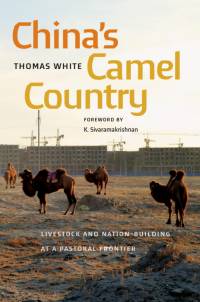Om China's Camel Country
How animal conservation became a defense against cultural erasure
China today positions itself as a model of state-led environmentalism. On the country's arid rangelands, grassland conservation policies have targeted pastoralists and their animals, blamed for causing desertification. State environmentalism?in the form of grazing bans, enclosure, and resettlement?has transformed the lives of many ethnic minority herders in China's western borderlands.
However, this book shows how such policies have been contested and negotiated on the ground, in the context of the state's intensifying nation-building project. Drawing on ethnographic fieldwork in Alasha, in the far west of China's Inner Mongolia Autonomous Region, Thomas White describes how ethnic Mongols have foregrounded the local breed of Bactrian camel, mobilizing ideas of heritage and resource conservation to defend pastoralism.
In exploring how the greening of the Chinese state affects the entangled lives of humans and animals at the margins of the nation-state, this study is both a political biography of the Bactrian camel and an innovative work of political ecology addressing critical questions of rural livelihoods, conservation, and state power.
Visa mer

